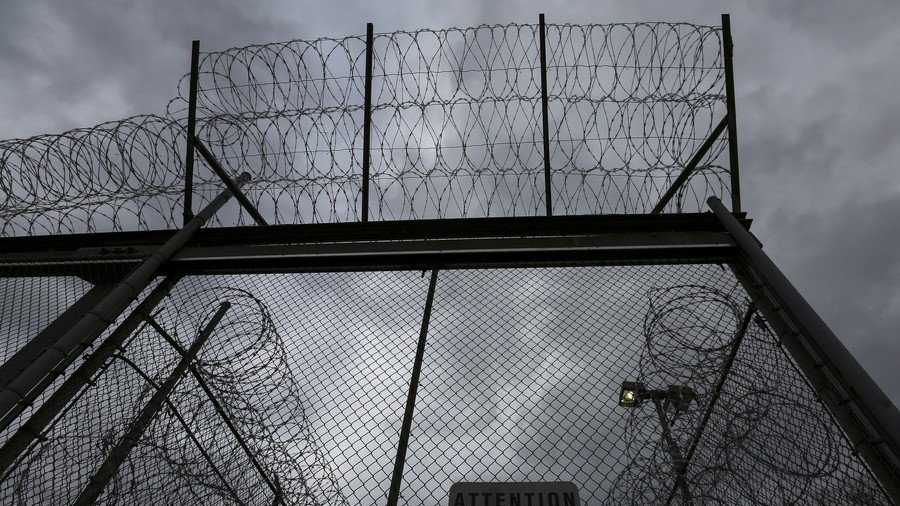‘First step’: House passes prison reform bill uniting (some) Democrats and Trump

The US House of Representatives overwhelmingly backed the First Step Act, which would allow more inmates to earn an early release from federal prisons and end practices such as shackling female prisoners during childbirth.
The bill, House Resolution 5682, was approved on Tuesday evening by a vote of 360 in favor and 59 opposed. Co-sponsored by Representatives Doug Collins (R-Georgia) and Hakeem Jeffries (D-New York), the bill managed to unite President Donald Trump and some of his critics among the Democrats.
Under the law, federal inmates would be able to earn up to 54 days per year in “good time credits” towards an early release, up from the previous cap of 47. This would apply retroactively, meaning that around 4,000 inmates could be released immediately once it is signed into law, according to Axios.
Meet Ricky, an intern in my office who was incarcerated as a youth and turned his life around. He just graduated from college and is headed to law school in the fall! #FIRSTSTEPAct#CriminalJusticeReformpic.twitter.com/mkWah1hB8X
— Hakeem Jeffries (@RepJeffries) May 22, 2018
The law also seeks to fund additional vocational and rehabilitative programs in federal prisons, to the tune of $50 million over five years, in order to help former convicts rebuild their lives after release. Among the reforms in the treatment of inmates, it would abolish the practice of shackling female prisoners during childbirth and place inmates no further than 500 miles away from their families.
However, the Leadership Conference on Civil and Human Rights argued that good conduct release would be “embedding deep racial and class bias” into decision-making and exclude illegal immigrants and serious offenders.
A number of Democrats have also come out in opposition to the bill, arguing that it does not go far enough. In an op-ed published Monday in the Washington Post, former Attorney General Eric Holder called it a “misguided legislative effort” and a “tempting half-measure,” saying it did nothing to advance sentencing reform.
Last week’s letter from Senators Cory Booker (D-New Jersey), Kamala Harris (D-California) and Dick Durbin (D-Illinois) opposed the bill along the same lines, saying they would be “unwilling to support flawed prison reform legislation that does not include sentencing reform.”
Jeffries responded by calling the Booker-Durbin-Harris letter “riddled with factual inaccuracies and deliberately attempts to undermine the nationwide prison reform effort.”
Van Jones, a former adviser to President Barack Obama, also broke ranks with the Democratic leadership and backed the bill.
Awful to see parts of liberal establishment desperately trying to kill bipartisan prison reform in the US House. Some so partisan=would rather hurt GOP than help prisoners. Luckily 60+ GRASSROOTS groups support #FirstStepAct! They know we need to put real PEOPLE over politics!
— Van Jones (@VanJones68) May 22, 2018
Jones thus found himself on the same side as Trump, who endorsed the bill during his weekend summit on prison reform at the White House. The president’s daughter Ivanka and her husband Jared Kushner have been among the major backers of the bill inside the executive branch, arguing it would help reduce recidivism.
“The single biggest thing we want to do is really define what the purpose of a prison is. Is the purpose to punish, is the purpose to warehouse, or is the purpose to rehabilitate?” Kushner said at the meeting on May 18.
One of the guests expected at the summit was Philadelphia rapper Meek Mill, who was famously released from prison in April after being jailed for probation violations stemming from a 2008 weapons conviction. On Friday, however, Mill canceled his visit, saying that concerns over his association with Trump “might take away from creating a positive result.”
There are presently almost 2.3 million people behind bars in the US, of which 225,000 are in federal prisons and jails, according to the Prison Policy Initiative. Most federal convictions are for drug offenses. State prisons account for 1,316,000 inmates, of which 718,000 are imprisoned for violent offenses.
Like this story? Share it with a friend!















